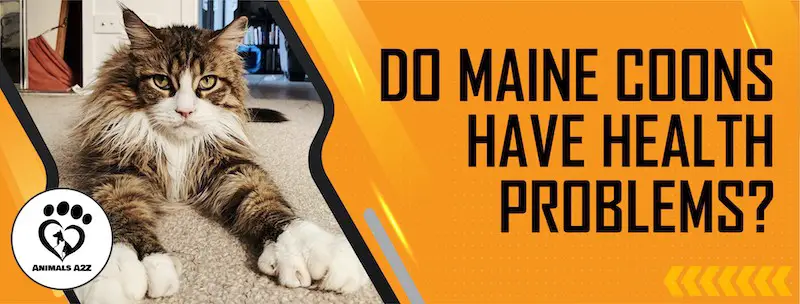Cats have long been known to be masters of disguise when it comes to hiding signs of pain. Maine coon cats are not an exception.
Table of Contents
Maine Coons are in general healthy cats
They are a happy and healthy breed of cats. However, like most cat breeds, they can also have health problems. This does not make them any less compared to other cats.
It is normal to worry about your pets because we care for them like family. However, we should remember that it’s normal for cats, including Maine coons, to catch diseases and health conditions from time to time. Most of the time, these are hereditary. This means the condition is somehow related to your pet’s breed.
What health problems do Maine Coon cats have
Health problem 1: Hip dysplasia
Though more commonly observed in dogs, hip dysplasia can also occur in cats. This is especially true for Maine coon cats. It can be mild, causing little or no pain at all. This health problem is caused by a hereditary defect of the hip socket. Research shows that males are more at risk than female coons because the disease may have developed because of the size of the breed. As we know, male coons tend to grow bigger than females.
Health problem 2: Heart diseases
Heart problems are life-threatening for Maine coons. The most common type of cardiological issue affecting coons is called feline hypertrophic cardiomyopathy. It usually affects middle-aged and older cats, causing an enlargement of the heart muscles and hereditary.
Health problem 3: Deafness
Another health issue unique to Maine coons is heritable or genetic deafness. It could also be caused by a treatable issue like ear polyps or an ear infection. It is always best to have an appointment with your vet for these issues to be 100 percent sure.
Health problem 4: Obesity
Most Maine coon owners spoil their cats and give them loads of food thinking it could maintain the large size of their cats. That is not true. It only leads to obesity, which is one of the major diseases that Maine coons have. Excess weight can only increase the risk to develop arthritis, diabetes, and other dangerous diseases for your cat.
Health problem 5: Spinal muscular atrophy
Spinal Muscular Atrophy or SMA is also a hereditary disease typically observed in Maine coons. SMA is caused by the death of spinal cord neurons activating skeletal muscles of the trunk and limbs, which can lead to muscle weakness. In fact, Maine coons with SMA may experience difficulty jumping. However, this disease does not really disrupt normal life as it doesn’t cause any pain.
Health problem 6: Gingivitis
It is the inflammation of gingiva or gums. As in humans, it causes redness and pain in the gums. Gingivitis can also be linked to other diseases. For a Maine coon, it can be associated with the feline leukemia virus (FeLV) and feline immunodeficiency virus (FIV). If it’s only a mild case, you can treat it with a mouth rinse.
Health problem 7: Renal failure
One of the most common diseases in older cats is kidney disease. Even a young kitten may face renal failure if they have inherited kidney defects or due to toxins. Renal failure is the inability of the kidneys to properly perform their functions of cleansing waste from the blood and regulating hydration.
Not to worry, though. Maine coon is a relatively healthy breed, especially if you know how to take good care of them. There are also a lot of tests available to know if your Maine coon inherited some genetic codes.
Are your Maine Coon really a mix?
How to keep your Maine coons healthy
- Treat your Maine coon as you would treat a young child. Help them keep out of trouble and away from objects that they shouldn’t be eating.
- Brush your cat’s fur daily. Their shaggy and thick fur need brushing to prevent tangles.
- Make kit a habit to check your Maine coon’s ears and clean if needed.
- Keep in mind that Maine coons are an active and playful kind of breed. They need daily play sessions that can stimulate their natural desire for hunting and exploring.
- Keep your Maine coon’s mind and body active through regular exercise. This will help fight obesity as well.
- Keep their litter boxes clean all the time.
- Make sure your Maine drinks loads of water.
Common questions about Maine coons and their health problems
What is the life expectancy of a Maine coon?
Their life expectancy greatly depends on how healthy their lifestyle is. Poor diet and low exercise can shorten your Maine coon’s life. However, you should keep in mind that their average lifespan is somewhere between 10-13 years. Some Maine coons can live up to 15 years of age.
Do Maine coons have breathing problems?
Like other cat breeds, Maine coons can experience problems in the lower respiratory tract. Allergens and irritants cause the lower airways and lungs to become inflamed and sensitive. Its symptoms may include coughing and wheezing. This condition is also known as “feline asthma”.
Why is my Maine coon panting?
A Maine coon may pant sometimes after exercise or when they are overly warm, just like dogs. Long-haired breeds are most capable of panting.
It is only natural for cats to catch some diseases every once in a while. However, that does not mean you should ignore these health problems. Taking care of your Maine coon should always be your priority. While cats do not live as long as humans, you can make sure that every minute is special for them.


